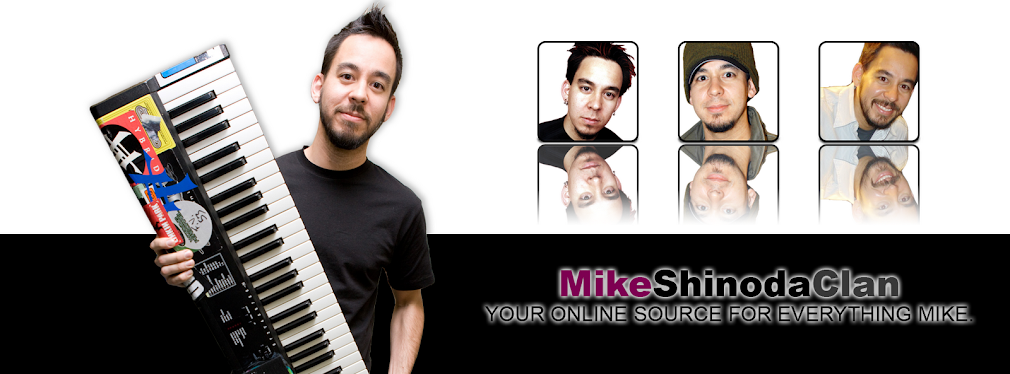Friday, February 11, 2005
Somewhere He Belongs
February 2006Linkin Park vocalist takes his hip-hop seriously
Mike Shinoda is part of the massive rock machine known as Linkin Park, which since breaking onto the national scene in 2000 has become one of the world's biggest bands. But Shinoda is occupied these days with his side project, Fort Minor, which released ''The Rising Tied" last fall and is now on its first tour. Shinoda wrote the songs on ''The Rising Tied," played most of the instruments, and produced the record with the supervision of Def Jam president (and recent Linkin Park collaborator) Jay-Z. We caught up with Shinoda to talk about his new project, hip-hop credibility, and what the future holds for Linkin Park.
Q. The most obvious place to start is, why create Fort Minor at all?
A. First let me say I'm more than proud of what Linkin Park has done and stands for. That said, it's true that I wanted to make a grittier, hip-hop-oriented record and try to develop a sound that just wouldn't be viable within what we do in Linkin Park. This is also a much more individualized and personal record. The songs here are really drawn from my personal experiences [including ''Kenji," which deals with his family's internment during World War II]. And I wanted to work with people I knew and was comfortable with, and that means that they didn't have to be big names. I had a certain luxury to try different things and attempt others -- I wanted to play every instrument -- and it started out that way, but I ended up doing what I thought was best to make a great record.
Q. You also seem to want to prove that you have a devotion to hip-hop and that you want to be taken seriously in that arena.
A. Most definitely. I had Jay-Z executive-produce the record, and I really wanted to dig deeper into my hip-hop roots and make an honest record that would be respected on the streets.
Q. On ''Cigarettes" you criticize a lot of hip-hop for being indulgent and solely focused on the hustle.
A. That was important, although some people may say, ''Who is he to criticize?" But as Jay said to me, ''If you love hip-hop, then you can criticize it." I mean, the main point of the song is that you can really love something like the movie ''Scarface," but don't be it. That's not productive to who we are as people.
Q. To criticize some elements of hip-hop, though, you had to make damn sure you were making an authentic hip-hop record.
A. Good point, and something I worried about. That's why I had Jay executive-produce, because it's important to have fresh ears. When he told me that he loved what we did, I knew we had nailed it, and I was completely flattered. I mean, this is Jay-Z.
Q. Now this Fort Minor tour is a short one, and you are playing small venues.
A. That was crucial. We really wanted to bring the music to the people and make sure it was an intimate thing. But the show is a real production, sort of like a Nine Inch Nails show. That was the prototype for the tour and show. Play just a few shows but blow people away with the depth and power. We have 11 people onstage, and it's really musical. We were told that we'd be losing a lot of money this way -- a big production with few shows in small venues -- but I didn't care. I want this to be for the fans and show the music in the right light.
Q. Are you concerned that the record hasn't sold very well in the States? It hasn't even sold 100,000.
A. That's true, and to be honest I don't know why. We've done very well outside the United States, though. Maybe it's because it's more like an underground hip-hop record. But I'm confident that people will find it and the sales will build slowly. They all don't have to be immediate knockouts. You can get spoiled by some of the great success we've had with Linkin. Expectations aren't really in perspective for this kind of record.
Q. Let's talk about your position in the music business and how it has changed. Your music has always been about acknowledging the people who live on the margins and trying to bring some inclusiveness to our culture. But you have moved from being a struggling rock performer venting against [the establishment into being part of the establishment itself]. After all, you are now one of music's wealthiest performers.
A. That's true, but I always believed you can make money, just don't let money make you. We still try as much as we can to be fan oriented and do meet-and-greets at venues so fans know we are just like them, normal human beings, nothing more. I think it's also about the music you make, and I don't think our music represents corporate structure and exclusionary inclinations.
Q. Tell me about Linkin Park's threat to leave Warner Bros. In the end, was it really just a negotiating ploy to get as big a contract as you got?
A. I really can't talk about that at all except to say that I'm very happy that Linkin Park is making another record that will be out in the fall. It started out a bit of an ugly situation, but it all worked out great, and Linkin Park is back to making music. We feel we haven't reached our creative peak yet, and I think the label believes that also. So what it comes down to is moving forward in the right way and delivering a great record. That is really always the bottom line.
thanks to lptimes.com













0 comments:
Post a Comment